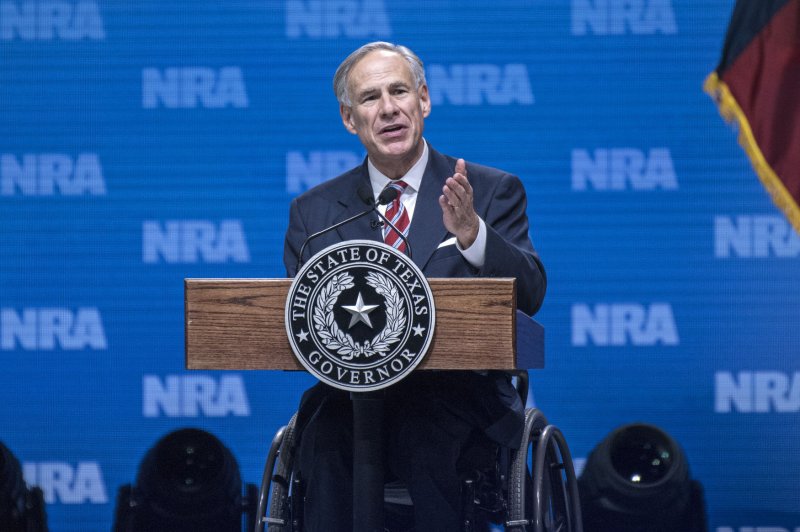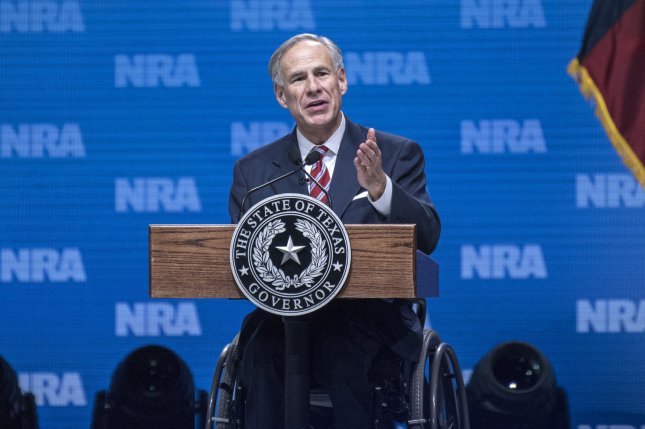April 16 (UPI) — Texas Gov. Greg Abbott has reached a fourth and final deal with governors of Mexican border states to end increased inspections of commercial vehicles at international bridges that gridlocked commercial traffic.
Abbott signed an agreement with the governor of Mexico’s Tamaulipas state on Friday in a move expected to bring international trade back to normal after Abbott-ordered enhanced inspections at key commercial bridges caused over a week of backups that left truckers waiting for hours and sometimes days to get loads of produce, auto parts and other goods into the United States.
At a press conference with Abbott in Weslaco, Texas, Tamaulipas Gov. Francisco Javier García Cabeza de Vaca said his state will continue its five-part security plan, launched in 2016, that includes stationing police every 31 miles on state highways, personality and polygraph tests for officers in the state police department, increasing salaries for police officers and offering scholarships for the children of state police officers.
Abbott said the deals with Chihuahua, Coahuila, Nuevo León and Tamaulipas were “historic,” calling them an example of how border states can work together on immigration. But three of the four Mexican governors said they will simply continue security measures they put in place before Abbott ordered the state inspections.
The fourth, Nuevo León Gov. Samuel Alejandro García Sepúlveda — whose state shares only 9 miles of the 1,200-mile Texas-Mexico border — agreed to set up new checkpoints for commercial trucks.
Abbott said he was relying on the Mexican governors to reduce the number of migrants crossing the Rio Grande.
“If those expectations are not fulfilled, and we see an increase or even a continuation of the illegal immigration traffic we’re currently seeing, Texas can reinstate the enhanced security measures for [commercial] vehicles coming across the border,” Abbott said at the news conference with Cabeza de Vaca.
When he announced the initiative last week, Abbott said the goal was to stop illegal drugs and migrants from being smuggled into the state. As of Friday, the Department of Public Safety had not reported any drugs seized or migrants apprehended as a result of the state inspections.
DPS Director Steve McCraw, who was also at Friday’s news conference, said the reason troopers hadn’t found any drugs or migrants in commercial trucks is because drug cartels “don’t like troopers stopping them, certainly north of the border, and they certainly don’t like 100% inspections of commercial vehicles on the bridges. And once that started, we’ve seen a decreased amount of trafficking across bridges – common sense.”
DPS troopers are allowed to conduct only mechanical inspections and those checks have been done after vehicles have already passed through U.S. Customs and Border Protection inspection stations.
Abbott’s critics say the Texas governor’s order was a political ploy to raise his profile in his reelection campaign which has disrupted the economies of Texas and the four Mexican border states.
Mexico is among the United States’ largest trading partners. The total trade between the two countries amounted to $56.25 billion in February, according to recent government data. Texas’ biggest ports of entry — Port Laredo, Ysleta, Pharr International Bridge, Eagle Pass, El Paso, Brownsville International Bridge and Del Rio International Bridge — accounted for nearly 65% of the total trade between the U.S. and Mexico in 2021.
“A lot of our members are absolutely flabbergasted that this was allowed to happen and that it happened for so long for the sake of border security,” said Dante Galeazzi, president of the Texas International Produce Association. “We feel like we were used as bargaining chips.”
Beto O’Rourke, Abbott’s Democratic opponent in the November election, said Abbott is doing a victory lap for a problem he created.
“Abbott is the arsonist who torched the Texas economy by shutting down trade with Mexico to score cheap political points,” he said. “Now he wants credit for putting out the fire by announcing these ridiculous ‘security agreements.’ Texans aren’t buying it and we’ll never forget the chaos Abbott has caused to our economy and our border communities.”
Adam Isacson, director for defense oversight at the Washington Office on Latin America, an advocacy group for human rights in the Americas, said Abbott may have made a political miscalculation with the inspections.
“This seems like it’s not working out for him. His base is pro-business and anti-immigrant and he has just antagonized business while giving voluntary free rides to immigrants,” he said, referring to another Abbott order that has provided bus rides to Washington, D.C., to transport asylum-seekers who have been processed and released by federal authorities – if they volunteered to go.
At Pharr International Bridge, TVs and computer monitors are key trade commodities, along with produce such as avocados, dates, figs and pineapples. When commercial traffic came to a halt at Pharr, it hit businesses and truckers transporting perishable goods hard.
Seats and parts for aircraft engines and motor vehicles enter the U.S. through the Del Rio International Bridge. Passenger and commercial vehicles are key imports that come through El Paso. And Brownsville International Bridge largely sees imports of digital storage devices, as well as motor vehicle and computer parts.
Some industries, including automakers, need to import and export products back and forth across the border more than once to assemble parts into a finished product.
Guadalupe Correa-Cabrera, a political science professor at George Mason University who studies U.S.-Mexico relations, said she struggled to understand why Abbott would issue a border directive that would inflict so much damage on his own state’s economy.
“Why shoot himself in the foot? Well, he’s not. He’s calculating,” she said. “This is part of a political spectacle because we are in midterm elections and the economy is bad.”
Abbott can take action that would negatively impact the state economy and not have to pay a price for it because voters are already blaming the Biden administration for inflation, Correa-Cabrera said.
“He’ll probably blame Washington for the unrest and anger that this crisis is going to cause voters,” she said. “You have the perfect excuse to run in an electoral year and to support your party in an electoral year but [you generate] the sense that the other party is to blame for the situation.”
In his appearance with the Nuevo León governor on Wednesday, Abbott told Texans who were upset about the clogged border to “call President Biden and tell him to maintain the Title 42 expulsion policy that has been in place for years.”
Abbott’s order came on the heels of the Biden administration’s announcement that by late May it planned to end Title 42 — a rule by the U.S. Centers for Disease Control and Prevention that federal immigration officials have used to turn away recently arrived migrants at the U.S.-Mexico border, including asylum seekers. Launched in the early weeks of the pandemic, it’s aimed at preventing the spread of COVID-19, but Republicans have pushed for its extension, saying it’s needed to keep order at the border.
This article originally appeared in The Texas Tribune. Read the original here.
The Texas Tribune is a member-supported, nonpartisan newsroom informing and engaging Texans on state politics and policy. Learn more at texastribune.org.

